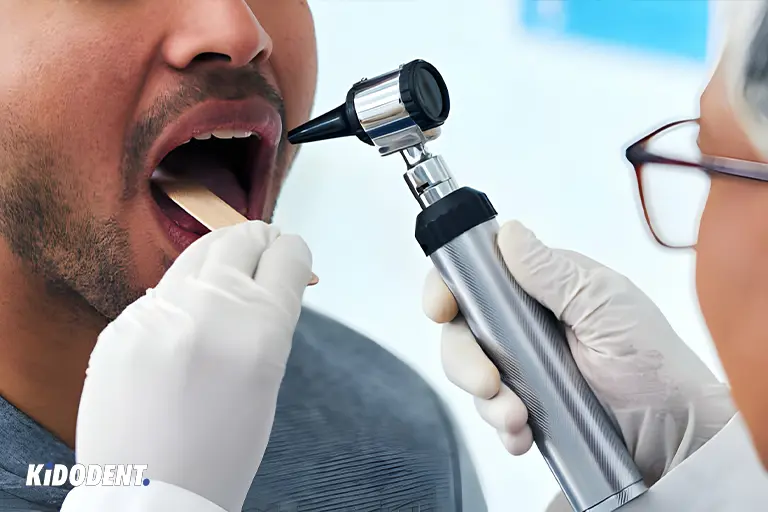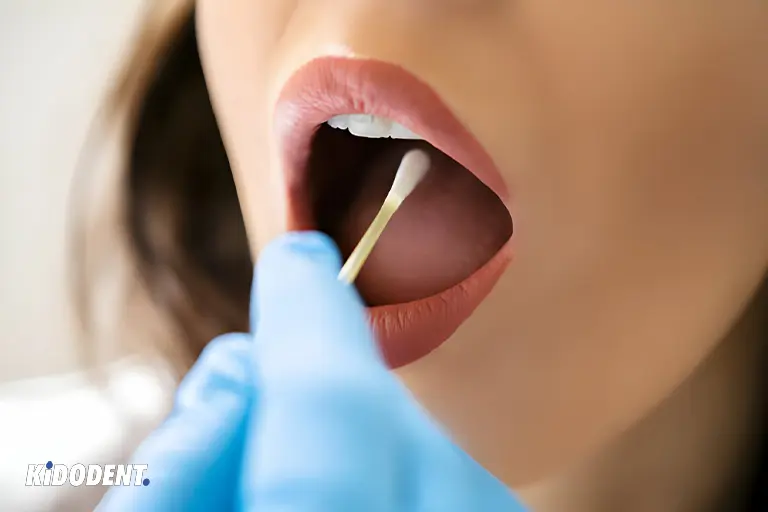Mouth cancer develops in the mouth and throat due to abnormal cell growth (neoplasm) and in 90% of cases is the result of squamous cell carcinomas, which is an oral malignancy. If we want to say exactly where oral cancer occurs, we mean lips, gums and alveolar ridge, floor of the mouth, oral mucosa, and oropharynx (including soft palate, back of the tongue, and pharyngeal wall).
Tobacco use and alcohol consumption are the primary risk factors that cause oral cancer. There are also other causes, signs and symptoms to detect mouth cancer and the treatment options that we will discuss.
Who is more likely to be at risk of mouth cancer?
- It happens twice as high in men than in women
- Adults over the age of 40
- Heavy smokers and drinkers (when alcohol and tobacco are both used by the person, the risk of oral cancer is as high as 100 times in these people )
- People exposed to too much sunlight
What are the symptoms of mouth cancer?
- Having patches of white color lesions that can’t be scarped (known as leukoplakia) and last more than 2 weeks
- Patches of red or white mouth ulcers or lesions that do inhibit in your mouth for longer times (2 weeks)
- Mouth ulcers especially those that are specifically located on the floor of the mouth, oral mucosa, the soft roof of the mouth
- Thickening feelings in the throat like something is stuck in your throat
- Changes in voice
- Your tongue and other parts of your mouth becomes numb
- Difficulties in moving your jaws and tongue, chewing and speaking
- Sore throat
- Pain in the mouth or constant pains in the ear
- Denture wearers feel uncomfortable and tightness of their dentures due to inflammations of the soft tissue or gums

What causes mouth cancer?
Common reasons that lead to oral cancer can include:
Tobacco use
Smoking is one of the most well-known causes of mouth cancer. The risks of head and neck cancer is very high in people who smoke cigarette or have other tobacco habits like chewing betel (as in India) or areca nut.
Alcohol use
The American Cancer Society states that 70% of patients with oral cancer have the habit of drinking alcohol. This raises the alarm to be aware of alcohol risks for oral health. The type of alcohol drink is not important but the daily dose is. If you drink more, like 4 drinks daily, you are increasing the cancer risks at a faster pace.
Human Papillomavirus (HPV)
HPV infection associated with sexually transmitted viruses especially HPV type 16 is one of the causes of mouth cancer that can occur in younger adults below 40 years of age. Having multiple partners, and oral sex practices are primary contributing factors to the development of this infection.
Age factors
The aging population can be at higher risk of cancer diseases due to physical changes and immune system weaknesses.
Sunlight exposure
When you are exposed to too much UV light, this increases the risks of lip cancer and then spreads to the mouth, causing oral cancer.
Immune system medications
There are some immune system drugs that people use to treat their immune illnesses that may also increase the risks of cancer diseases.
Through oral screening. Your dentist or doctor checks for any signs of lesions and mouth ulcers. They may look for changes in color, texture, swellings, and crusty parts in all parts of your mouth and oropharynx area. This can be helpful to diagnose oral cancer symptoms earlier and treat the disease in the initial stages.
Imaging. X-rays, CT scans, MRI scanning, and the latest imaging methods like PET are useful ways to detect oral cancer. Also, they may use endoscopy to take images of your throat and down in the oropharynx area of the mouth. This allows the doctors to have a clear picture of any signs of cancer-related lesions to reach a perfect diagnosis.
Biopsy. It is used to surgically remove the part of the lesion or ulcer in your mouth for more examinations. A biopsy can help doctors and dentists detect any malignancy in the growth of cells and other changes that can show traces of mouth cancer.
What are the treatments for mouth cancer?
Depending on the stage of your mouth cancer, you will need various treatment options. For example, to treat patients in the early stages of cancer, doctors use surgery or radiation therapies. But for severe cases in later stages, some treatment strategies are applied to get the best result to treat your oral cancer. These treatments include surgery and postoperative radiotherapy or a combination of radiation therapies and chemotherapy.
What happens after my oral cancer surgery or radiation therapy?
Surgery, radiation therapy, and chemotherapy can all have some side effects on your body. Depending on the site of oral cancer, the treatment time, and the stage of the disease, these side effects can be mild or serious and affect your daily life in every aspect.
When you undergo surgery to treat your mouth cancer, the soft tissues in your mouth that are affected by the cancer cells should be removed. These can include some part of your tongue, floor of the mouth, your jawbone, and any other affected areas in your mouth.
Surgery vs radiotherapy
Generally, surgery is better because the side effects are not as serious as radiation therapy and chemotherapy. For surgery, you may need cosmetic and functional reconstruction of the disfigurement as a result of the cancer surgery. You may need dental implants or dentures to restore your teeth and even cosmetic surgeries of lips or other parts of your lower face or even your neck.
Radiation therapy and chemotherapy have serious side effects that need time and patience to recover or even years of regular checkups and visits. Hair loss is one common side effect that will happen after your radiation or chemotherapy. You are likely to experience changes in taste, dry mouth because of damage to salivary glands in your mouth, oral thrush and other fungal mouth diseases and painful inflammation and mouth ulcers (acute mucositis).
How to prevent mouth cancer?
Some lifestyle changes are directly linked to higher quality of life and better oral hygiene health. Following these tips can help prevent mouth cancer from happening.
- Have regular dental checkups
- Quit smoking and other tobacco products
- Quit drinking alcohol
- Avoid too much sun exposure or use sunscreen creams or other lotions to have a protective shield against UV sun radiation
- Do routine oral hygiene practices
